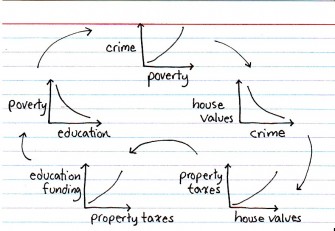I spent the past long weekend visiting a dear friend, an old Army buddy from all the way back in Basic training,
Empty-Handed Army, as well as his lovely and perceptive wife. We three spent nearly the whole waking portion of three days in deep discussion of a huge variety of topics, usually approaching them from a philosophical angle well outside my own comfort zone of practical applications and real-world historical proofs. The topic of education popped up again and again, mirroring and developing conversations I'd had with friends during my past month on leave. What are the goals of modern education? Who ought to be seeking higher education? How much does public policy contribute to educational success? Previous conversations with a wide variety of educators -- Masters of Education students, inner-city "alternative" school teachers, radical unschooling homeschoolers -- all came back to the same point: the overwhelming contributor to education success is cultural while public policy plays an important but fundamentally marginal role. I was reminded of all of this by a reader comment
shared by Jay Nordlinger:
If you asked a thousand people at random about their favorite teacher, how many would bring up how well the teacher employed education software, or whether she had a master’s degree from an ed school, or whether she took the class on fancy field trips, etc.?
To which Nordlinger follows up a quote from Dr. Gerrit Jan van Heuven Goedhart, a former UN High Commissioner for Refugees:
Many years ago I participated in a discussion on the problem of international education. After many experts had presented their complicated theories, an old headmaster of a certain school got up and quietly said: “There is only one system of education, through love and one’s own example.”
Nordlinger responds, "I don’t think I have ever read anything truer on the subject of education." I can only agree. The children of the radical unschoolers I know are well-adjusted and whip-smart. I have no doubt at all that my other friend's inner-city alternative school students would end up the same if they were brought up in a similar loving environment with good examples, no matter what the outward form of their schooling. Public education policy cannot solve cultural failings that are antithetical to education. Meanwhile, a functioning culture can mold successful youngsters even in the most dismal of school settings (cough cough Asians cough). All of our arguments over education policy that are based on the presumption that the right policy will produce success are just wasted breath.

